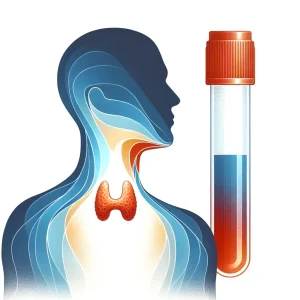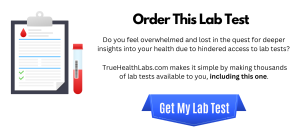Have you been wondering why you feel unusually tired or why your weight keeps shifting without explanation? A TSH blood test could unlock the answers by checking your thyroid health. This article explains everything you need to know about TSH levels, from what they mean to how you can get tested easily at TrueHealthLabs.com.
Table of Contents
- Understanding the TSH Blood Test
- Why the TSH Test Was Created
- How It Relates to Your Health
- Traditional vs. Functional Medicine Use
- Symptoms of Thyroid Issues
- Should You Get a TSH Blood Test?
- Why TSH Levels Matter
- How to Order a TSH Test
- What Happens During a TSH Blood Test
- Restoring Health with TSH Results
- Frequently Asked Questions
- References
Key Takeaways
- A TSH blood test measures thyroid-stimulating hormone to evaluate thyroid function.
- It identifies conditions like hypothyroidism and hyperthyroidism.
- Symptoms such as fatigue, weight fluctuations, or mood changes may signal thyroid issues.
- TrueHealthLabs.com offers a simple way to order TSH blood work yourself.
Understanding the TSH Blood Test
Experiencing unexplained exhaustion or body changes? A TSH blood test examines thyroid-stimulating hormone levels in your blood. This hormone, produced by the pituitary gland in your brain, directs your thyroid gland in your neck to release hormones that regulate essential functions. Abnormal TSH levels indicate your thyroid might not be performing correctly. This TSH lab test provides a clear snapshot of your thyroid health.
Why Was TSH Lab Work Created?
Decades ago, physicians lacked precise methods to diagnose thyroid disorders. They developed the TSH blood test to address this gap, offering a dependable way to detect hypothyroidism (underactive thyroid) and hyperthyroidism (overactive thyroid). This innovation now empowers millions to identify thyroid issues accurately and pursue timely treatment.
How It Relates to Your Health
Your thyroid controls critical processes in your body. It determines how quickly you burn calories, stabilizes your heart rhythm, and maintains your body temperature. TSH levels reflect whether your thyroid functions properly. If they’re unbalanced, you might experience specific symptoms tied to these processes. A TSH blood test connects these dots for you.
Traditional vs. Functional Medicine Use
Traditional medicine employs the TSH lab test as a primary tool to diagnose thyroid conditions. Physicians use it to confirm disorders and prescribe treatments like hormone replacement. Functional medicine also relies on this test but often combines it with additional assessments, such as Free T3, free T4, reverse T3 and thyroid antibodies like TPO antibodies and TG antibodies to explore how thyroid health impacts your entire thyroid system.
Symptoms of Thyroid Issues
Common Signs to Recognize
Thyroid imbalances often reveal themselves through noticeable symptoms. You might feel persistently tired, notice unexpected weight gain or loss, or experience mood shifts without clear cause. These signs suggest your TSH levels may need checking.
- Unexplained weight gain or loss
- Fatigue or low energy levels
- Thinning of the outer third of your eyebrows.
- Fingernails that become thinner over time.
- Feeling too hot or too cold
Less Frequent Symptoms
Other indicators can be subtler. Look for:
- Dry, flaky skin despite moisturizing.
- Slow wound healing.
- Memory issues.
- Puffy face.
- Hoarseness or voice changes.
- Hair thinning or falling out in clumps.
- A heart rate that speeds up or slows down unusually.
TSH blood work can pinpoint if these stem from thyroid dysfunction.
Should You Get a TSH Blood Test?
Do those symptoms resonate with you? If thyroid problems run in your family or you’re noticing changes, a TSH blood test offers insight. It detects issues early, allowing you to address them before they worsen. Taking this step now could prevent future health struggles.
Why TSH Levels Matter
Knowing your TSH levels give you information you need to take action to restore optimal thyroid function. With your TSH levels in hand, your doctor can recommend targeted actions, such as:
- Specifically adjusting your diet to include iodine-rich foods.
- Prescribing medication to balance hormone production.
- Helps your functional medicine doctor design a natural plan to create a better functioning thyroid.
Balanced TSH levels enhance your mood, promotes weight loss, and improve the function of every cell in your body, giving you more years of feeling good.
| Group | Normal TSH Range (mIU/L) | Key Notes |
|---|---|---|
| Adults | 0.4 to 4.0 (Medical); 1.0 to 3.0 (Functional) | Functional range targets peak health. |
| Pregnant Women | 0.1 to 2.5 (1st trimester); 0.2 to 3.0 (2nd); 0.3 to 3.0 (3rd) | Levels adapt to support fetal growth. |
| Children | 0.7 to 5.97 (varies by age) | Ranges shift with development stages. |
| Older Adults (65+) | 0.5 to 5.0 | Higher levels reflect aging effects. |
Reference Source: American Thyroid Association
How to Order a TSH Test
Ready to check your TSH levels? TrueHealthLabs.com simplifies the process. You can order a TSH blood test online in minutes and get your results in days.
What Happens During a TSH Blood Test
Wondering what to expect? A TSH lab test involves a brief visit to a lab. A technician uses a needle to draw a small blood sample from your arm, which takes only a moment. The sample then goes for analysis, and you receive your TSH levels shortly after. TrueHealthLabs.com collaborates with only CLIA labs to ensure accuracy.
Restoring Health with TSH Results
Your TSH blood test results clarify your thyroid status. They show if adjustments are necessary, enabling your doctor to tailor a plan. This might include medication or dietary changes, based on precise data. With TSH blood work from TrueHealthLabs.com, you address issues directly, accelerating your recovery.
Frequently Asked Questions
What does a high TSH level indicate?
A high TSH level suggests your thyroid isn’t producing enough hormones, a condition called hypothyroidism. You might feel fatigued or cold often.
Can a TSH detect every thyroid issue?
This test identifies many problems but isn’t exhaustive. Pairing it with free T4, free T3 and thyroid antibody tests provides a fuller picture of thyroid function and gives insights on why TSH may be high or low.
How often should I test my TSH?
Testing frequency depends on your health. For thyroid conditions, doctors may suggest quarterly checks. Without issues, annual TSH blood work suffices unless symptoms arise.
Do I need to fast for TSH blood work?
Fasting isn’t typically required for a TSH lab test.
Can the TSH test be wrong? How accurate is it?
This TSH test uses the very sensitive chemiluminescent method, which has a sensitivity of about 95–99% and a specificity of around 92–98%, meaning it correctly detects thyroid issues most of the time but can very occasionally be wrong.
That said, in some people, certain antibodies can interfere and give false results. A TSH test with HAMA treatment removes these interfering antibodies first, ensuring a more accurate reading for those who might have them.
Where can I get a TSH blood test without a doctor?
TrueHealthLabs.com offers thousands of lab tests, including the TSH blood test. Order in minutes. Your test results are added to your account in just a few days.



